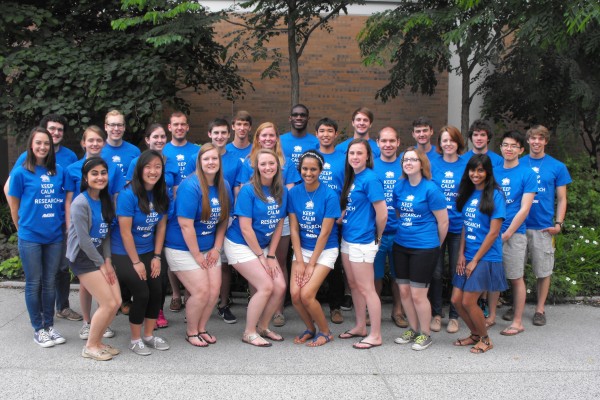Hearing aids may improve balance
Enhancing hearing appears to improve balance in older adults with hearing loss, according to new research from Washington University School of Medicine in St. Louis. Patients with hearing aids in both ears performed better on standard balance tests when their hearing aids were turned on compared with when they were off.
Wickline receives chancellor’s innovation award
Samuel A. Wickline, MD, has been chosen to receive the Chancellor’s Award for Innovation and Entrepreneurship at Washington University in St. Louis. He will receive the honor Saturday, Dec. 6. Faculty achievement awards will be presented to David A. Balota, PhD, and Steven L. Teitelbaum, MD.
Breast cancer vaccine shows promise in small clinical trial
A breast cancer vaccine developed at the School of Medicine is safe in patients with metastatic breast cancer, results of an early clinical trial indicate. Preliminary evidence from the small clinical trial, led by William Gillanders, MD, also suggests that the vaccine primed the patients’ immune systems to attack tumor cells and helped slow the cancer’s progression.
Treatment strategy may reduce infants’ wheezing caused by virus
The antibiotic azithromycin may reduce the risk of
recurrent wheezing in infants hospitalized with a common respiratory
infection, according to a small pilot study at the School of Medicine. Reduced wheezing may lower an infant’s
risk of developing asthma over the next several years, according to the
researchers, including first author Avraham Beigelman, MD.
New treatment for Marfan syndrome shows promise
An investigational treatment for Marfan syndrome is as effective as the standard therapy at slowing enlargement of the aorta, the large artery of the heart that delivers blood to the body, according to a new study co-authored by Alan C. Braverman, MD. Slowing aortic growth in Marfan syndrome is important in protecting against the tearing of the aorta.
Errors in single gene may protect against heart disease
Rare mutations that shut down a single gene are linked to lower cholesterol levels and a 50 percent reduction in the risk of heart attack, according to new research led by Nathan Stitziel, MD, PhD, of the School of Medicine. The gene, called NPC1L1, is of interest because it is the target of the drug ezetimibe, often prescribed to lower cholesterol.
Washington University receives new grant to host Amgen Scholars Program
Washington University in St. Louis has been awarded a grant from the Amgen Foundation that will provide hands-on laboratory experience to undergraduate students through the Amgen Scholars Program. This marks the fifth year that Washington University is participating in the program.
Novel tinnitus therapy helps patients cope with phantom noise
Patients with tinnitus hear phantom noise and are
sometimes so bothered by the perceived ringing in their ears they have
difficulty concentrating. A new therapy does not lessen perception of
the noise but appears to help patients cope better with it in their daily lives, according to new research led by Jay Piccirillo, MD.
Heart’s own immune cells can help it heal
The heart holds its own pool of immune cells capable of
helping it heal after injury, according to new research in mice at
Washington University School of Medicine in St. Louis.
Genome sequenced of enterovirus D68 circulating in St. Louis
Researchers led by Gregory A. Storch, MD, at Washington University School of Medicine in St. Louis, have sequenced the genome of enterovirus D68 sampled from patients treated at St. Louis Children’s Hospital. Nationwide, the virus has spread rapidly in recent months and caused severe respiratory illness in young children, with some patients requiring hospitalization.
View More Stories

